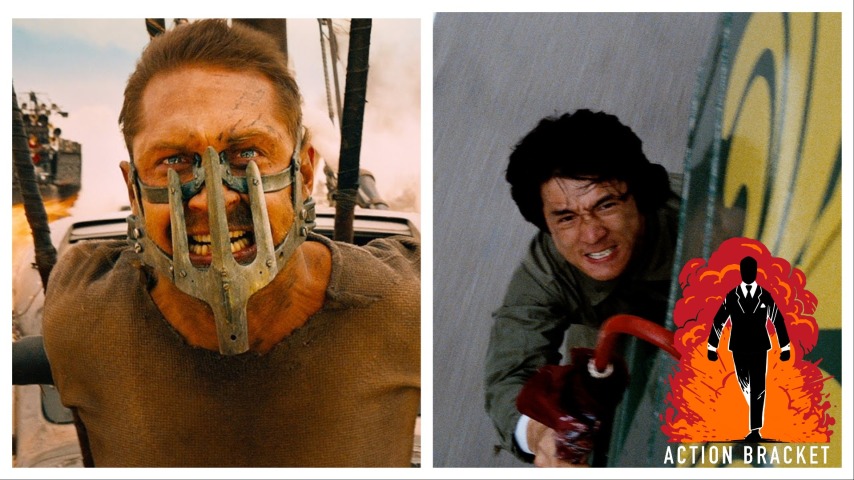Is Mad Max or Police Story the greatest action franchise of all time?
Jackie Chan or Max Rockatansky? Who will walk away from our Action Franchise Tournament still alive for a sequel?
Photo: Warner Bros., Miramax
This is it. The hordes of lackeys were dispensed with. The love interest’s betrayal has been accounted for. The MacGuffin has been tracked down. The sociopathic second-in-command has died in spectacular fashion. All that’s left is the final boss battle. After a contentious first, second, third, and fourth round, The A.V. Club‘s Action Franchise Tournament enters into its final fight with two all-timers ascending towards the throne: It’s Police Story vs. Mad Max.
Jackie Chan’s three-ring Jackass stunt circus or George Miller’s ridiculous death race—only one of these decades-spanning juggernauts will hold the title of the greatest action franchise of all time. You, the readers, still have a chance to decide the fate of your chosen winner in our poll, but after the fall of the near-deities Ethan Hunt and Neo, we’ve found our final champion.
It’s not surprising that neither of these last two action franchises are American. Hollywood has always been a pioneer in the realm of blockbusters and franchises, but its abilities with and interest in adding action to that mix have always come second to what that action serves: A perpetual-motion machine whose replicable formula of set pieces, heroic quips, and boilerplate plots consistently prints money and fill the molds of action figures. So many American action franchises bury their stunts in other genre elements, or shoehorn action sequences into otherwise unrelated intellectual properties in order to give them a four-quadrant summer-flick zing, that the relatively recent resurgence of more action-forward fare has been greeted with a renewed popular and professional appreciation for stunt performance as a discipline.
But the best action is often the purest—and representing Hong Kong and Australia are two of the most primal action franchises ever made. Jackie Chan’s cop stories are so boiled down to their base components that his character is alternatively called Chan Ka-kui or Chan Kwok-wing or Zhong Wen or simply Kevin or Jackie. These films aren’t named for him, but so vaguely titled they’re almost anonymous: Their star is simply an incredible cop who gets disgraced, maintains his personal dignity and devotion, then redeems himself through incredible feats of individual effort for the greater good. Similarly, even if Tom Hardy didn’t replace Mel Gibson as Max Rockatansky, the internal timeline of the franchise makes him being a single person living through the films’ desiccated nightmare nigh impossible. He’s an idea, a symbol. These aren’t people so much as they are vessels made for motion, bodies built to be endangered.
And yet, through this purity, the franchises approach different thematic philosophies. The Mad Max films live in defiance of authoritarianism, which the franchise fears will inevitably raise its iron fist when the world falls apart. Officer Rockatansky, beaten-down nihilist highway patrolman, gives way to Max, semi-hopeful wanderer. He faces down gang leaders and self-appointed dictators alike as he searches for the remnants of his humanity, this pattern culminating in Furiosa’s (Charlize Theron) revenge mission against Immortan Joe. “As the world falls around us, how must we brave its cruelties?” asks Furiosa. For Miller’s ecologically devastated world, reinvention, adaptability, and unfussy collaboration is key in order to survive, and to confront the unflinching despots at the top.
Police Story, though, is mostly about a single supercop’s superior coppage, and all the jokers around him who get in his way with their “rules” and “laws.” It’s unsurprising that a series named Police Story, a franchise that is the baby of an increasingly conservative director/star in Chan, has always had a regressive streak—one that gets more grim and personal as the series goes on. (It’s not a coincidence that Police Story: Lockdown involves the lead’s estranged relationship with his gay daughter.)
It would actually prevent that series from being the platonic cop franchise ideal, though, if it had any bigger ideas or a more progressive perspective. It is a power fantasy, plain and simple, one of personal injustices being overcome through singular feats of physical prowess—of might quite literally making right. It’s just silly enough, in most of its films at least, that the pricklier parts of its subgenre go down smooth.
Well, that, and the Police Story movies contain some of the best stuntwork ever captured by cameras, bar none. It’s amazing that Jackie Chan is still alive. The two-and-a-half-minute credit sequence of behind-the-scenes action from the first movie is better than most full action films, and probably contains more broken glass:
 Keep scrolling for more great stories.
Keep scrolling for more great stories.
